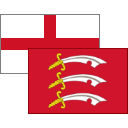The experience of Essex has so far been restricted to the rural so the lights bright of the nation's former capital, if you think the Roman ones really count, will make for a change from all them muddy estuaries, eh?
The outskirts from the train aren't exactly encouraging but one of only two things known in advance is that the town is rather more eye-catching than you might imagine.
The other is you'll be bashed up by a squaddie after sundown and while that can't be confirmed, the first fact can but more on that in a minute.
You're tempted into the narrow lanes off the main road up from Colchester Town Train Station. It's like Canterbury in miniature in here but with a disproportionately high density of barbers.


This would have all once been Roman, rebuilt after Boudica, or Boadicea if you went to school in the '80s, razed the place to the ground in 60 AD.
Not long after, the council did the same in the '70s and the Lion Walk Shopping Centre, not shown, takes its name from a Roman tile unearthed under what's now a Boot™s.
Meanwhile, back at the station, you know some people say you never see baby pigeons? Well, there's one in there.
The shopping centre could, sorry Colchester, just about be anywhere but the high street absolutely couldn't. Where else has a former town hall with an Edwardian Baroque design, it says here?

This stunning structure no longer functions in its original role but is available for weddings and bar mitzvahs with guided group tours for whatever it is they've got going on in there, these days.
A couple of other visual distractions, an old fire station repurposed for the retail and 'Jumbo' the water tower beyond the far end of the high street.


The Romanesque Revival, it says here, Victorian tower has something much older for company, the remains of the Roman Balkerne Gate, not shown. Not the oldest, it seems, but the largest surviving example in Britain and there's nothing outside of Nîmes in France to compare to it.
Its destruction appears to have been overlooked by Boudica, too busy slaughtering every Roman citizen, women and children included, they say.
Spoons have a tradition of naming their pubs based on the history of the town or the old building they invariably inhabit. The inevitable offering in a town of this size is called the Playhouse, the name of the town's former theatre.

There are no awards for their nearly-out-of-date ale and none for the Director of Contrived Waterhole Naming, neither, who was clearly on holiday or couldn't be bothered to get out of bed that day.
Whoever deputised on the decision is getting an immediate (0/5) for a lack of imagination and they might as well have stayed in bed themselves that morning.
As for inside? It's a Wetherspoon™s man!
There's no point asking this lady for directions to the castle and yes, Colchester has a castle.


Just head to the opposite end of the high street to find it still doing what it set out to do from day one, you can't miss it.
More boasting on the biggest front, this time the largest, intact, Norman castle keep in Europe, no less. That's down to the Roman foundations, they say, which, incidentally, are the oldest Roman foundations with the largest, intact, Norman castle keep on top of them in Europe, no less.
Inside houses a museum and this would normally be worth a visit but numbers are limited and the wearing of a mask is mandatory. Yes, this is post- Lockdown 1.0™ so the best bet looks to be a bit of fresh air.
That means there's no hanging around although there was a fair bit of it back in the 16th and 17th centuries. The Essex Witch Hunts saw over 200 suspects strung up, half of whom were hung following the findings of the self-appointed Witchfinder General.
It wasn't a real role and Suffolk-born Matthew Hopkins was no better than a bounty hunter, really, but he had access to the cells of Colchester Castle to incarcerate those unlucky enough not to drown.
He himself was only active for a couple of years but taking the century before him into consideration, this noose-happy lot make the hanging judges of Lancaster look conservative in comparison.
Unlike the museum, you're free to wander into Castle Park, the primest-piece of public greenery in Colchester, scratch that in Essex, scratch that in the UK, scratch that in the world!
The marvellously tended area to the right of the castle, not shown, should be up for some annual blooming prize or other but this whole expanse is a delight leading down to the River Colne via a bandstand and a good old boating lake, hooray!


It also leads, handily, over the bridge to Colchester's main train station, which turns out to be far more convenient for getting back to where you need to be.


It also saves having to hike back up that hill atop of which sits Colchester's fine centre.
That's something that was clearly identified as defensively advantageous way before the Romans but, unlike SlyBob, the lug up didn't bother Boudica and her bunch one bit.


